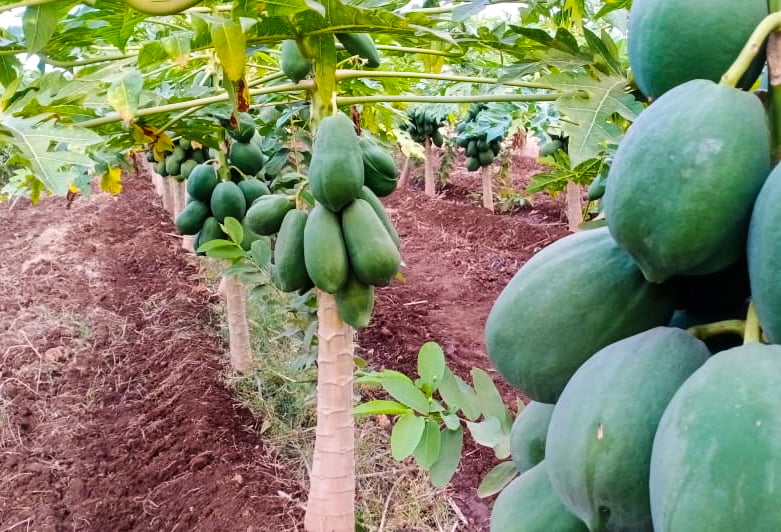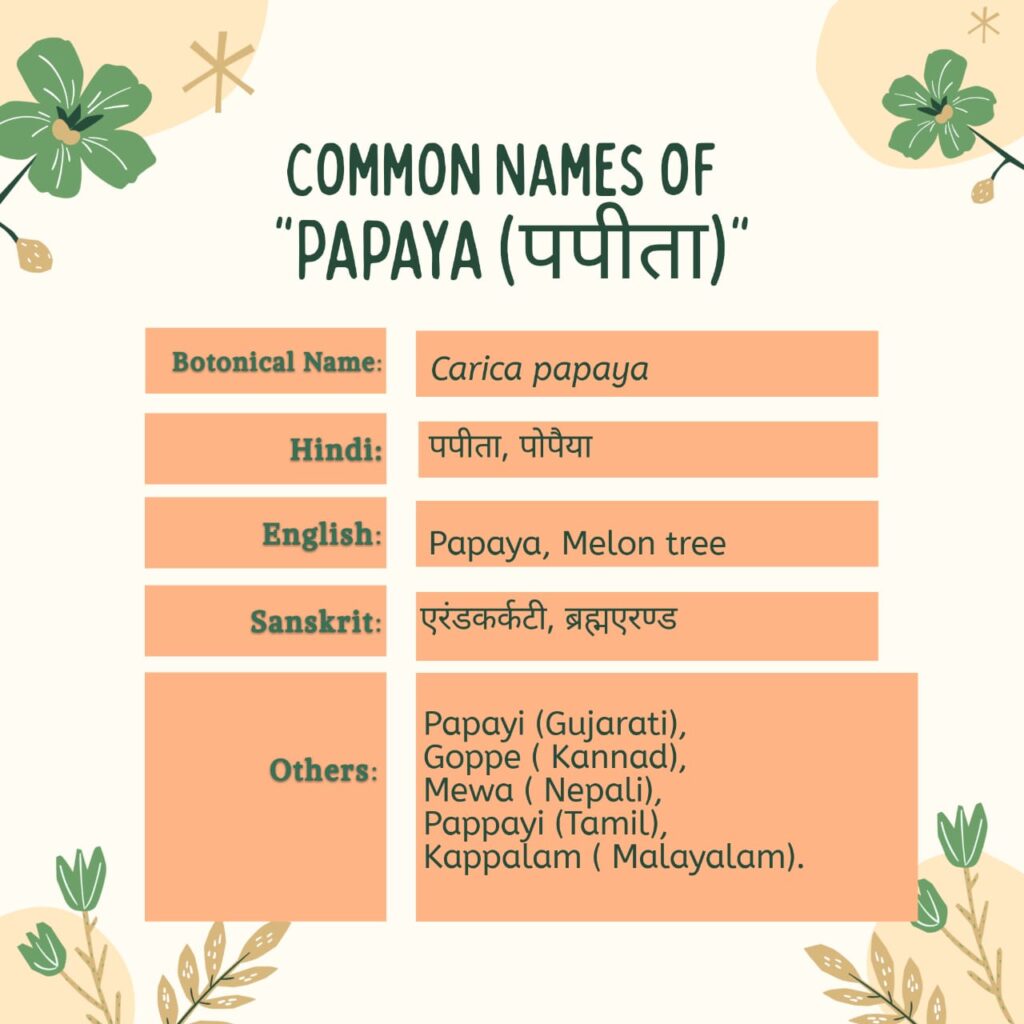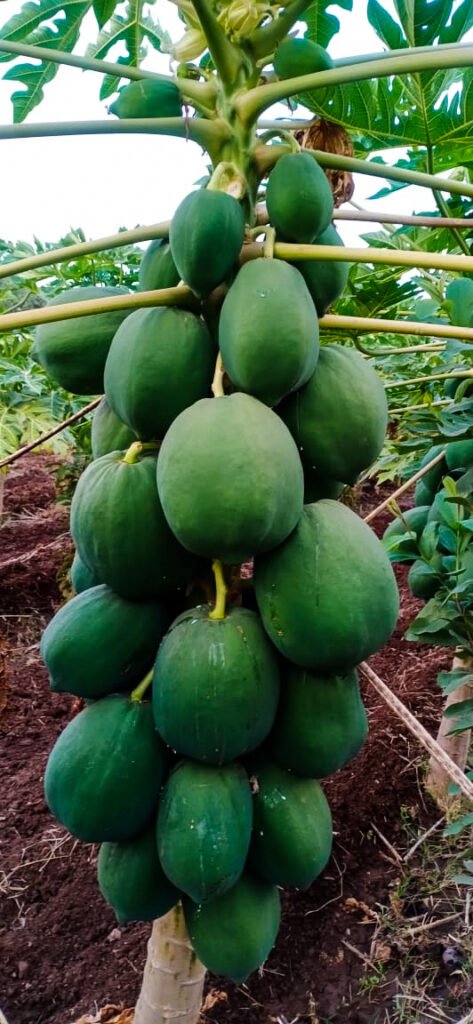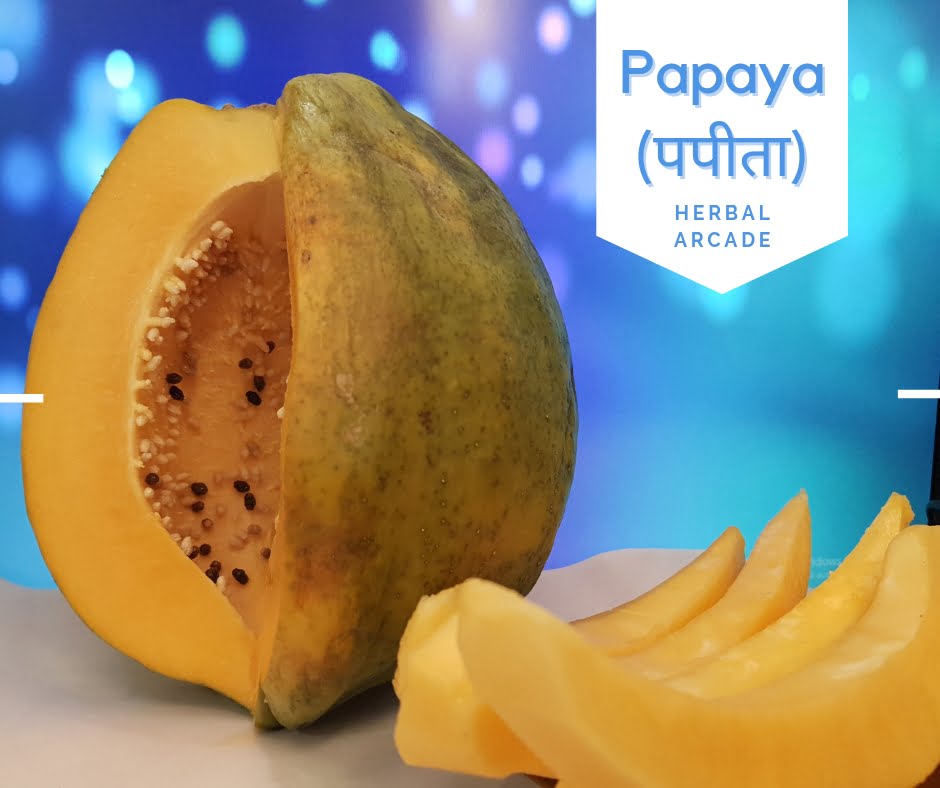14 Astonishing Benefits of Papaya (पपीता)(Carica papaya)| Introduction | Common Names | Usages | Gallery
Papaya (पपीता)( Carica papaya ) Introduction-
Papaya (पपीता) is originated in South America. It was planted first time in India by the Portuguese 400 years ago. It is faith that the first time in India it was fetched in Kerala. Kerala people called it kappkaay (कप्पकाय) which stands for fruit brought in the ship.
Hence, it is estimated that papaya is not Indian originated fruit. Today it is famous throughout the country and Mumbai, Pune, Ranchi, Chennai, and Banglore papayas are considered the best and popular.
Papaya trees are light small and easy to grow. It is about 5-6 m tall, straight, sparsely branched, and usually a single stem. Its stem is cylindrical, straight, and grey colored. Its leaves are palmated, large, and with a diameter of about 50-70 cm.

Its fruits are usually large cylindrical or oval-shaped, turns into yellow color after ripening. Papaya plant’s whole part contains latex. And its fruiting and ripening time is throughout the year.
Traditionally papaya has been used for curing malaria. Papaya contains beta-carotenoids, vitamin-A, C, E, zeaxanthin, calcium, potassium, fibers, folate, magnesium, copper, pantothenic acid and lycopene, etc.
Ayurvedic Properties of Papaya (पपीता)

Common Names of Papaya (पपीता)

Papaya (पपीता) Health benefits and usages
Papaya for Blisters on the tongue
Applying the latex of papaya on the tongue will help in healing the wounds on the tongue.
Papaya for Toothache
Just wrap the latex got from papaya, applying this on the tooth will help in suppressing toothache.
Throat problem
Mix latex of papaya into the water and doing gargle from it will help in suppressing problems of the throat.
Papaya for asthma
As papaya contains beta-carotene so that it is seen that people who consume papaya are not suffering from asthma.

Papaya for abdomen
An enzyme papain is found in papaya which helps in improving our digestion. With this papaya is also a rich source of water and fiber which helps in resisting constipation and improve digestion.
Papaya for Dyspepsia (Indigestion)
Consuming the unripened papaya as a vegetable will help in dyspepsia.
for Diarrhoea
- feeding ripened seeds with rice helps in diarrhea.
- Feeding unripened fruit of papaya as the vegetable will help in diarrhea.
for diabetes
At many places, papaya leaves are used as a traditional remedy for diabetes and controlling blood sugar levels.

for Piles
- feeding the papaya fruit helps in bleeding piles.
- Applying latex of unripened fruit of papaya on warts of piles will help in hemorrhoids ( Must consult to Doctor before applying).
for liver
Feeding fruit of papaya will help in diseases of liver & spleen.
for bones
Papaya also contains vitamin-k which helps in absorbing more calcium in the body so that bones can become more strong and fractures chances get reduced.
Papaya (पपीता) in Paralysis
Extract oil from the seed of papaya and fry it, have the massage after purifying. It will help in paralysis and also mouth paralysis.
for skin
Papaya is used as a remedy for healing the wound and burnt part as it has some beneficial enzymes.
Applying latex coming out through plant on tumor, tumult and etc will help in skin disorder.
Ringworm
- Grind the seeds of papaya and mix glycerin, applying this on ringworm will help in it.
- Applying the latex of papaya will help in suppressing ringworm and itching.
Papaya for Dengue/malaria
Recent studies published about papaya leaf have opened the new possibility to fight dengue and malaria, papaya leaves Extract and decoction are found very effective in fighting against dengue and malaria
Useful Part in papaya (पपीता):
- Fruit
- Leaf
- Latex
- Seed
Dosage:
- Fruit Pulp: 100-300gm
- Leaf Infusion: 30-60ml
- Seed powder: 1gm
** Above Post is for Information Purposes, data are collected from various literature or experiences of many physicians (vaidya). Please do consult your doctor before trying. **


One thought on “14 Astonishing Benefits of Papaya (पपीता)(Carica papaya)| Introduction | Common Names | Usages | Gallery”
Comments are closed.